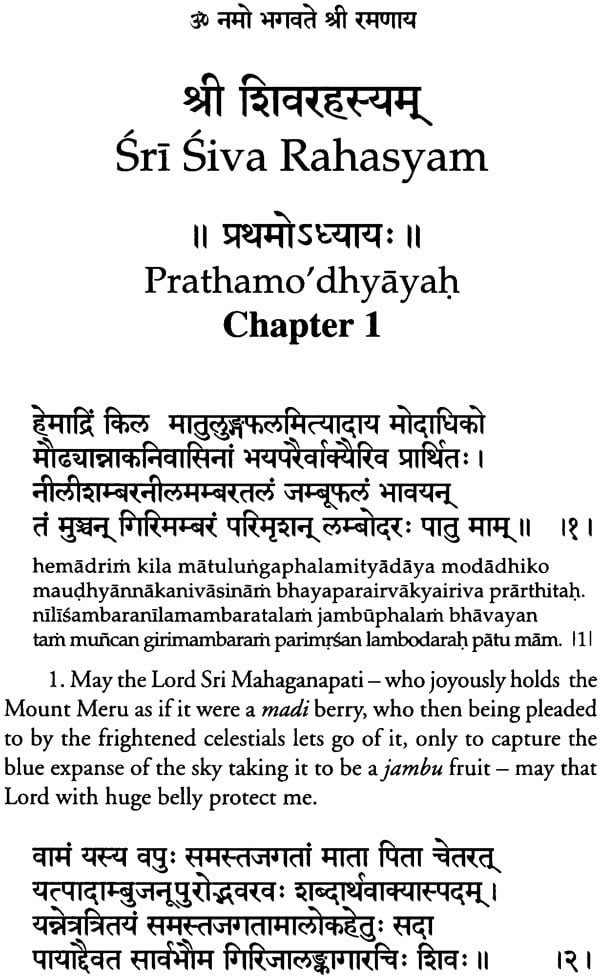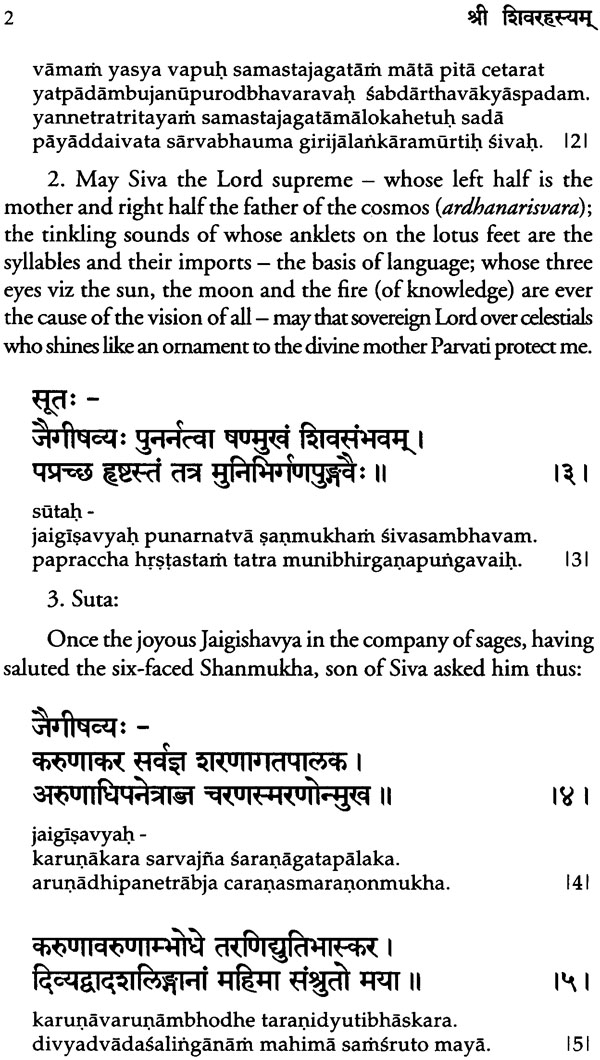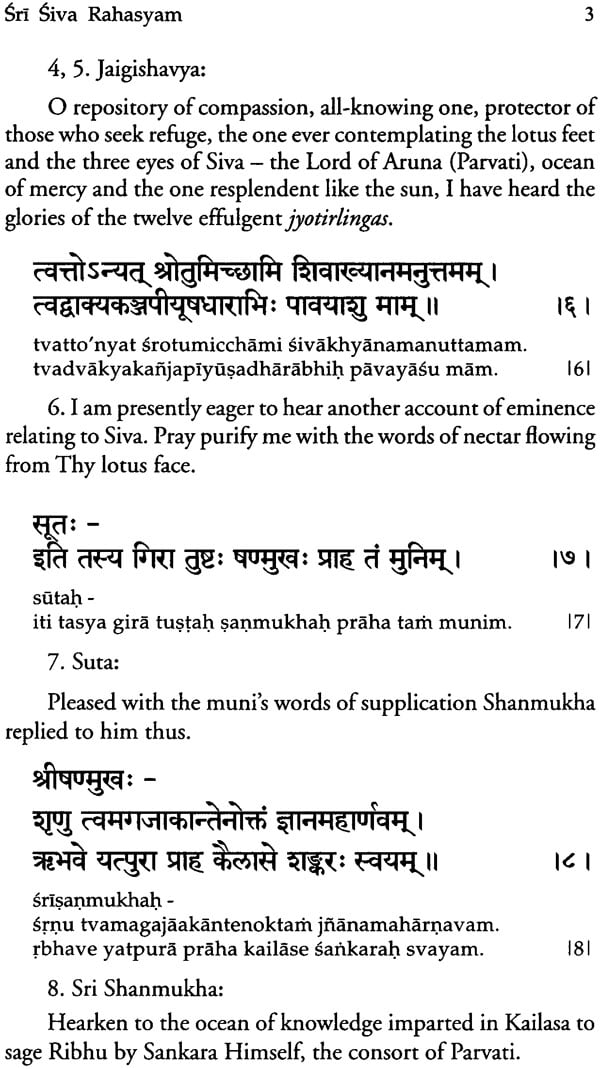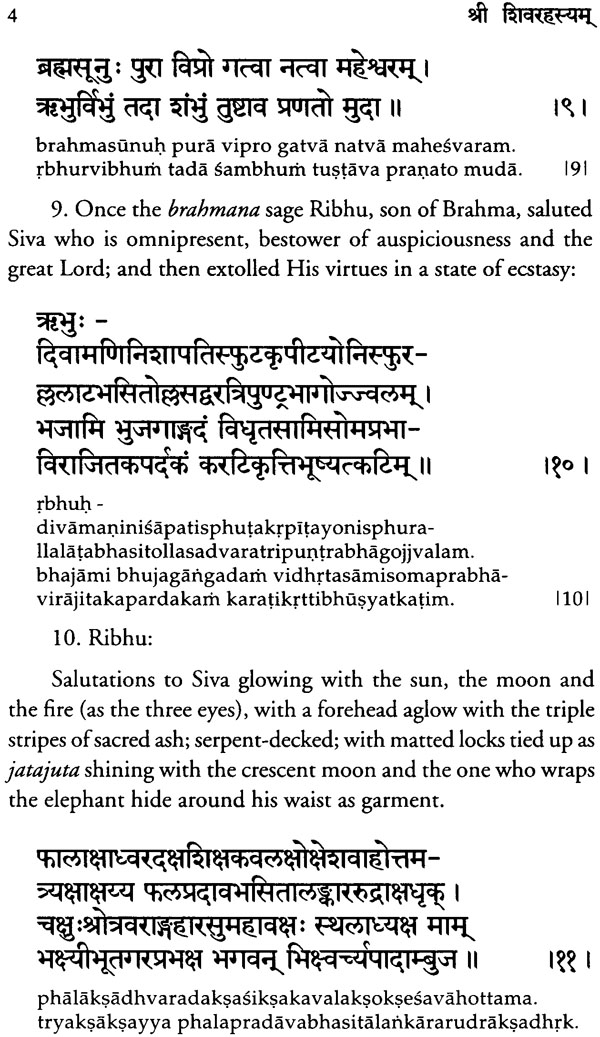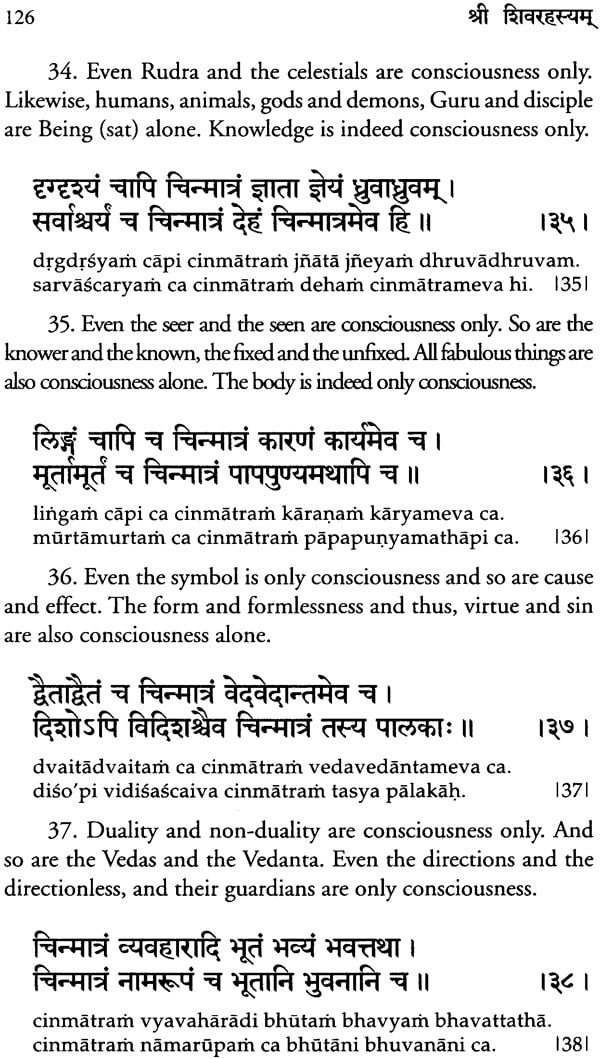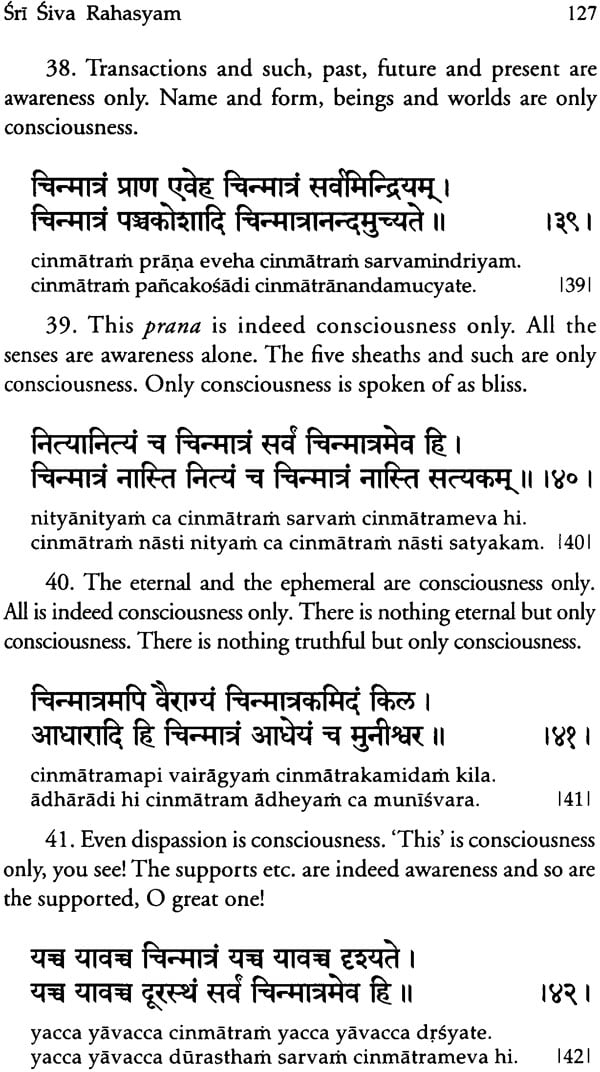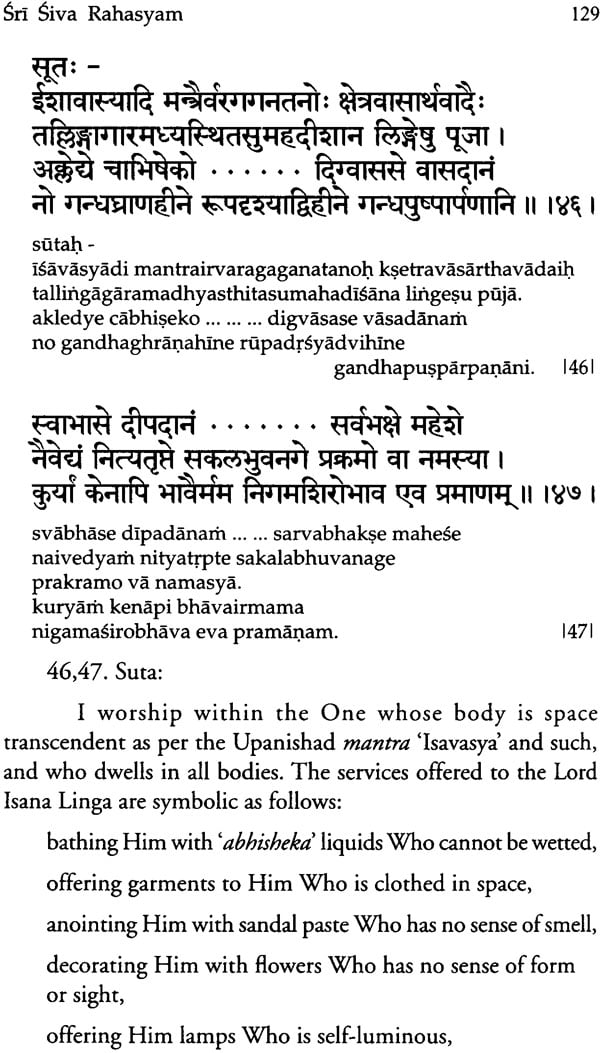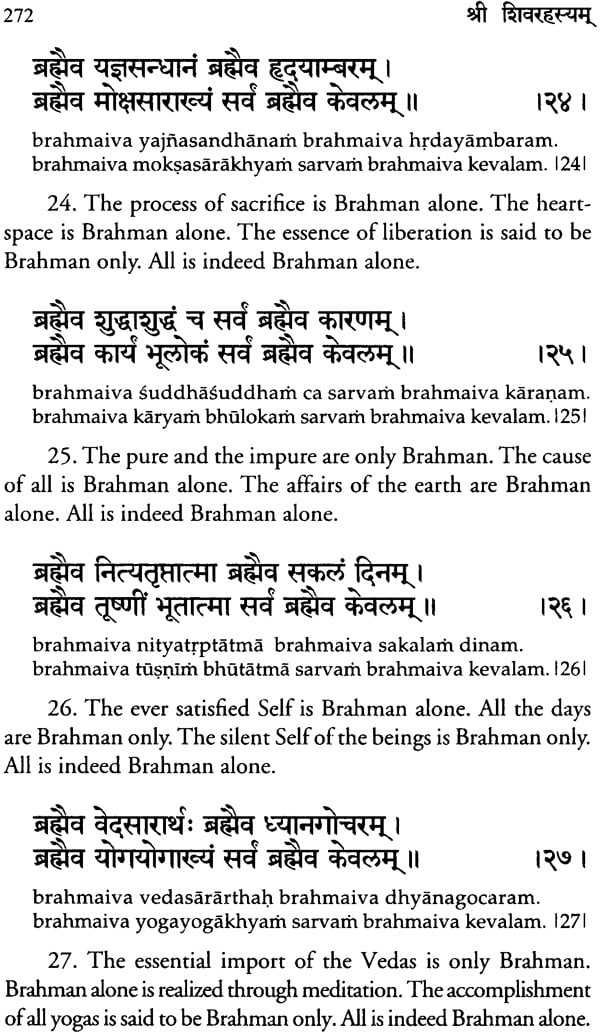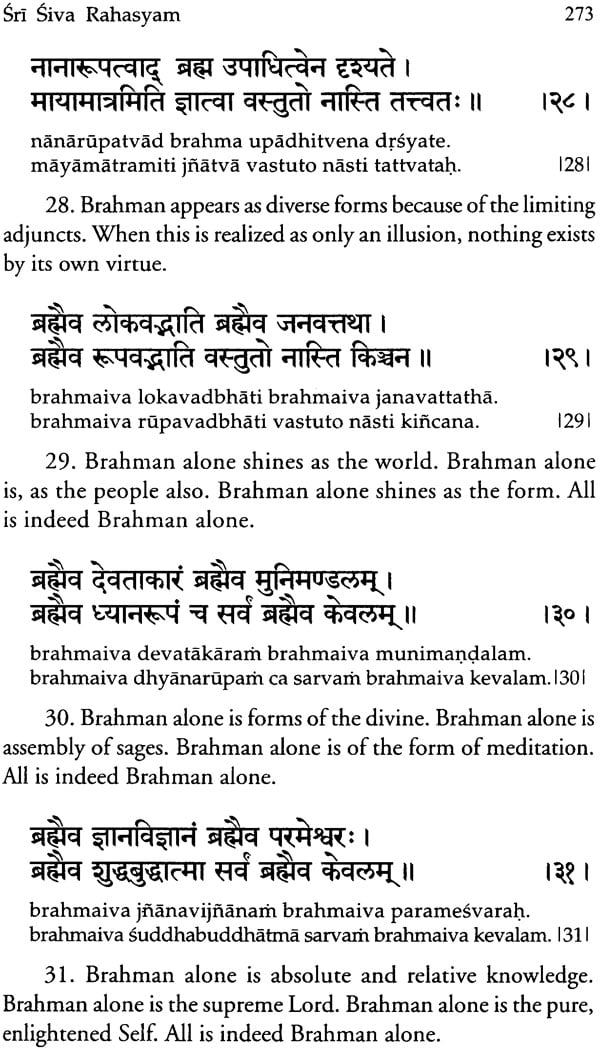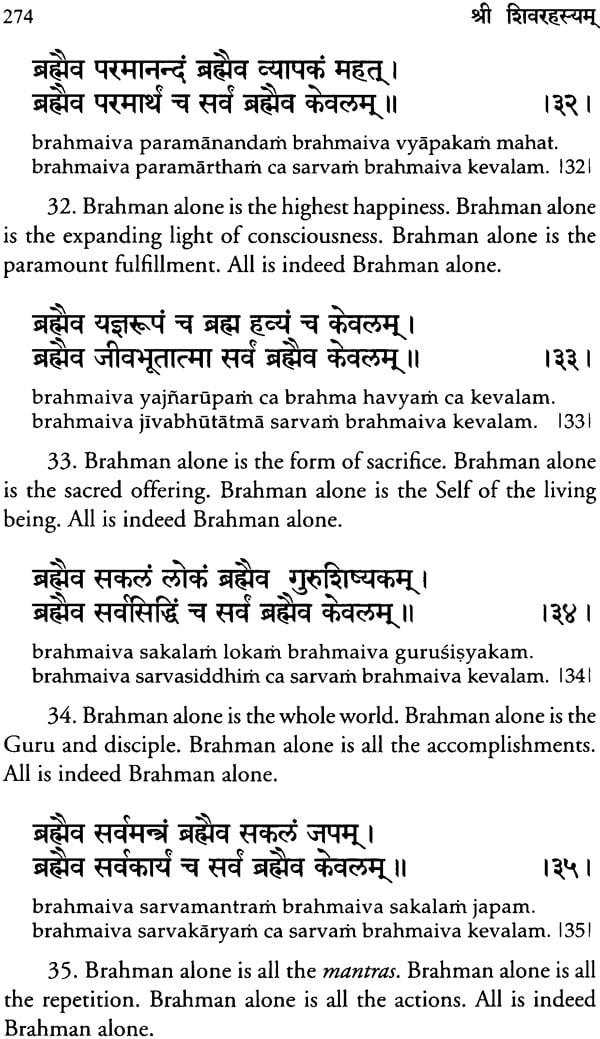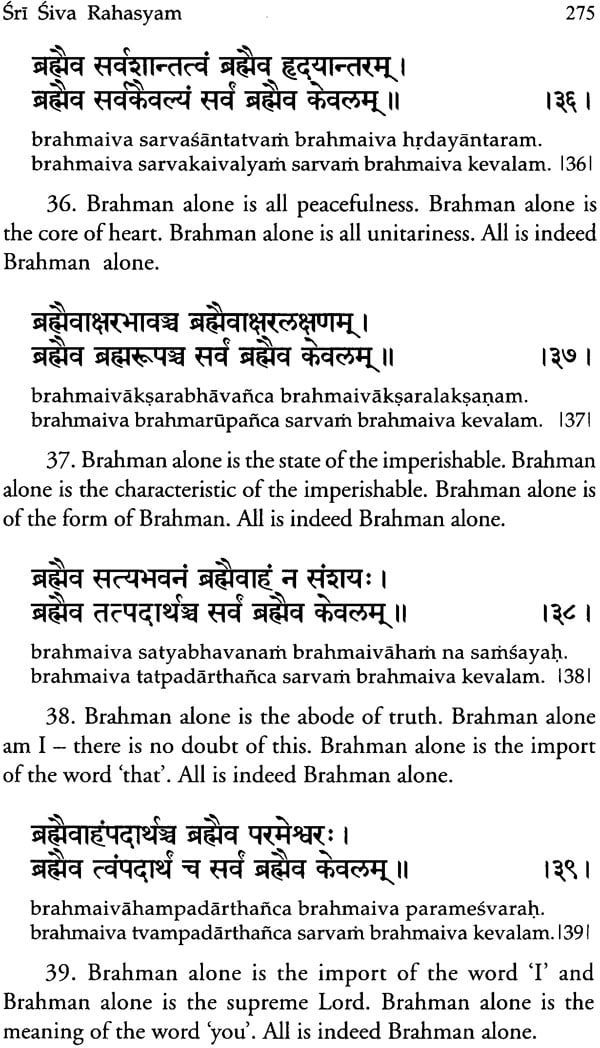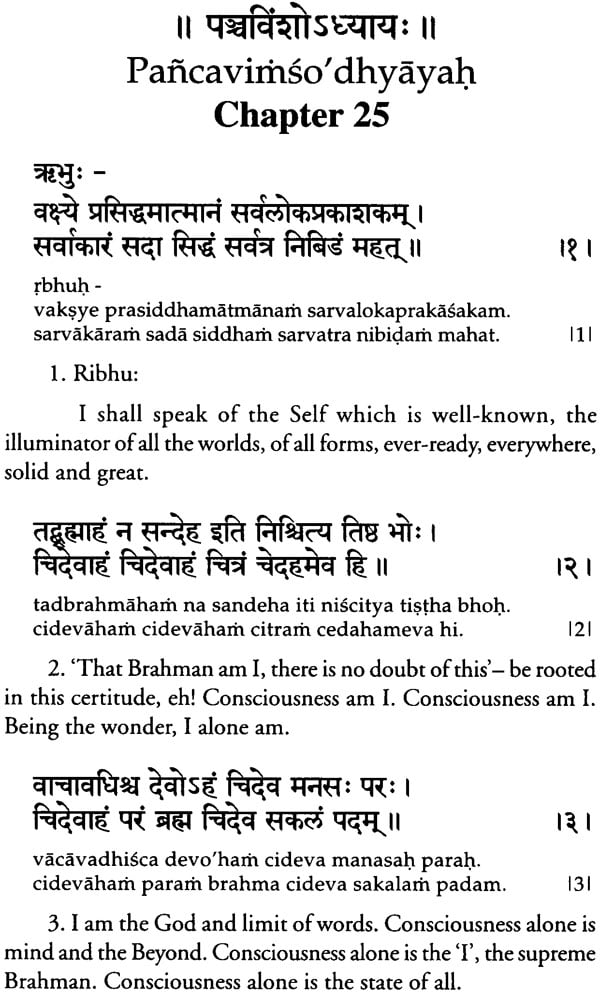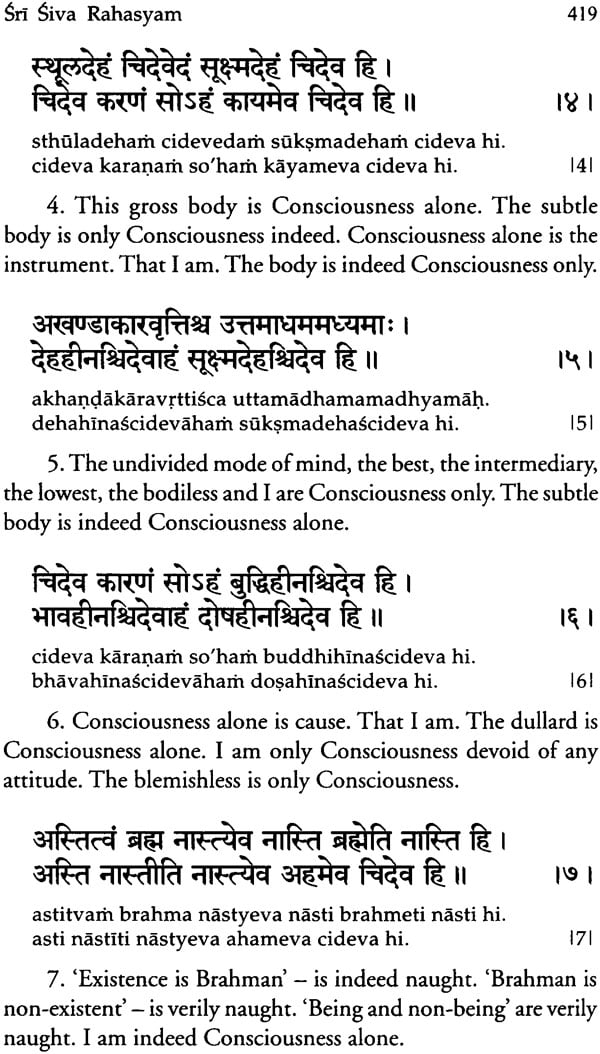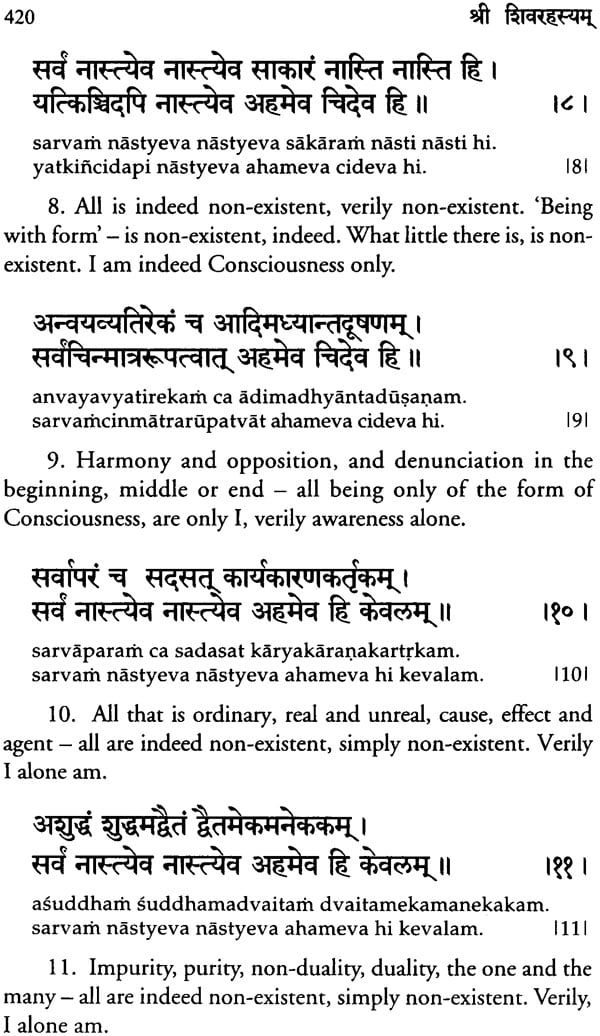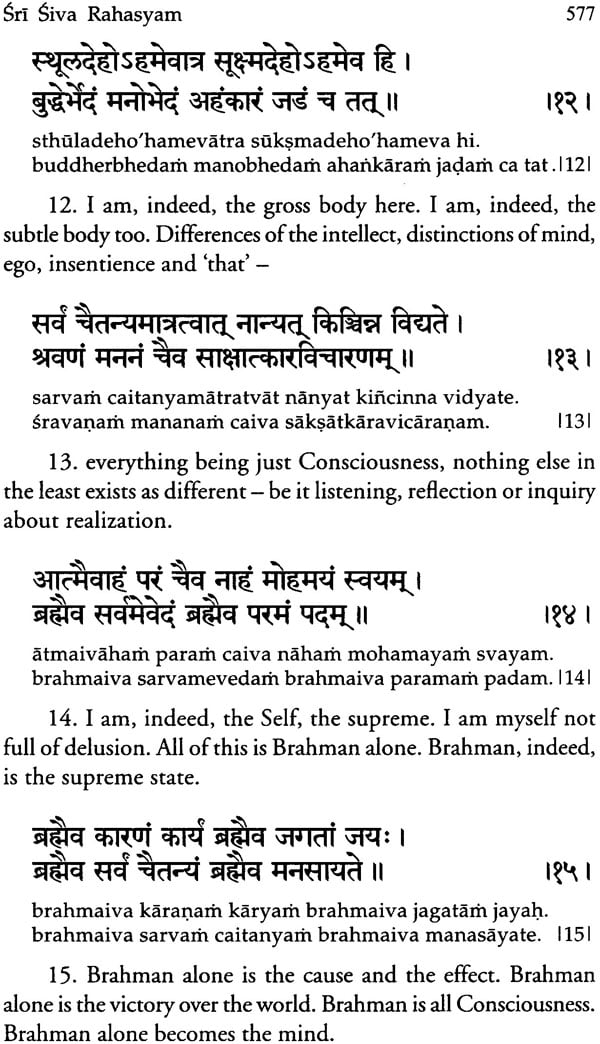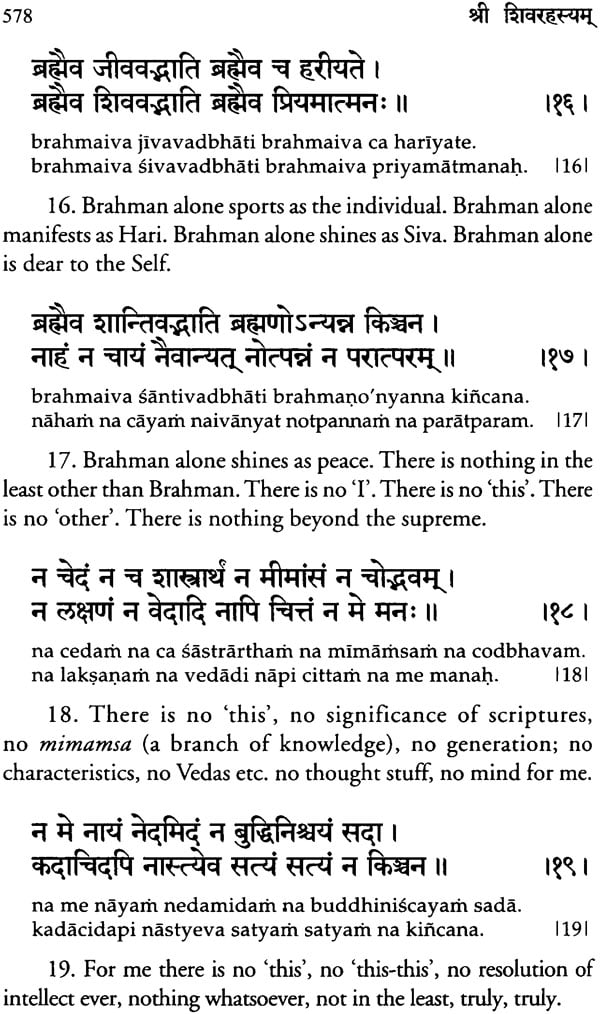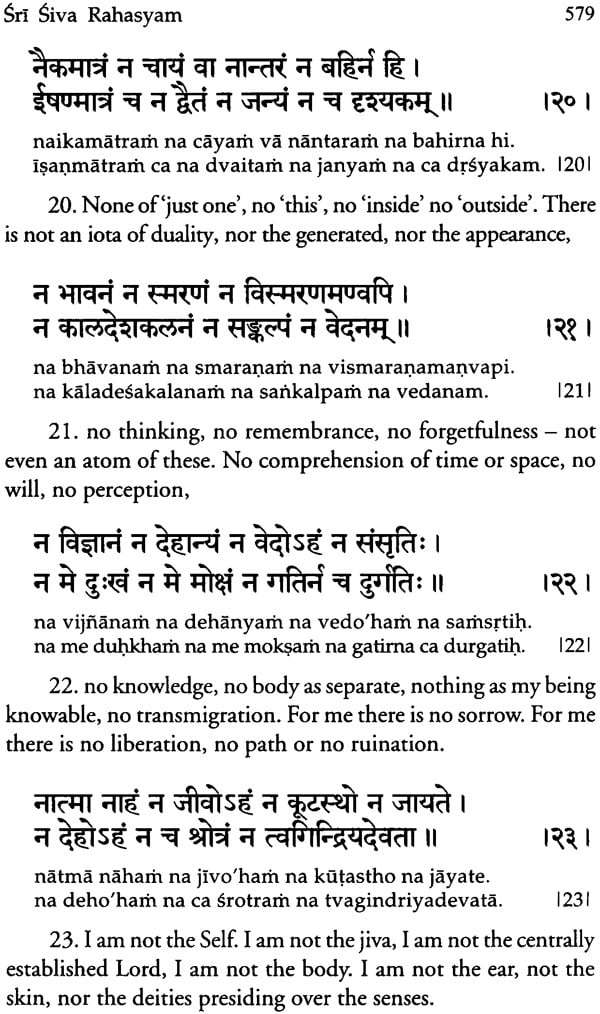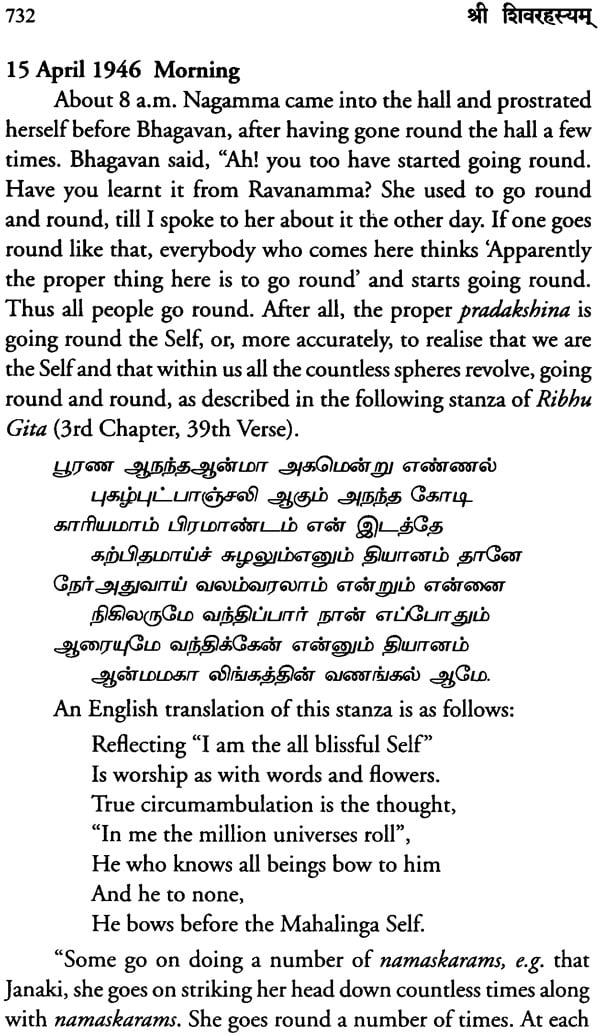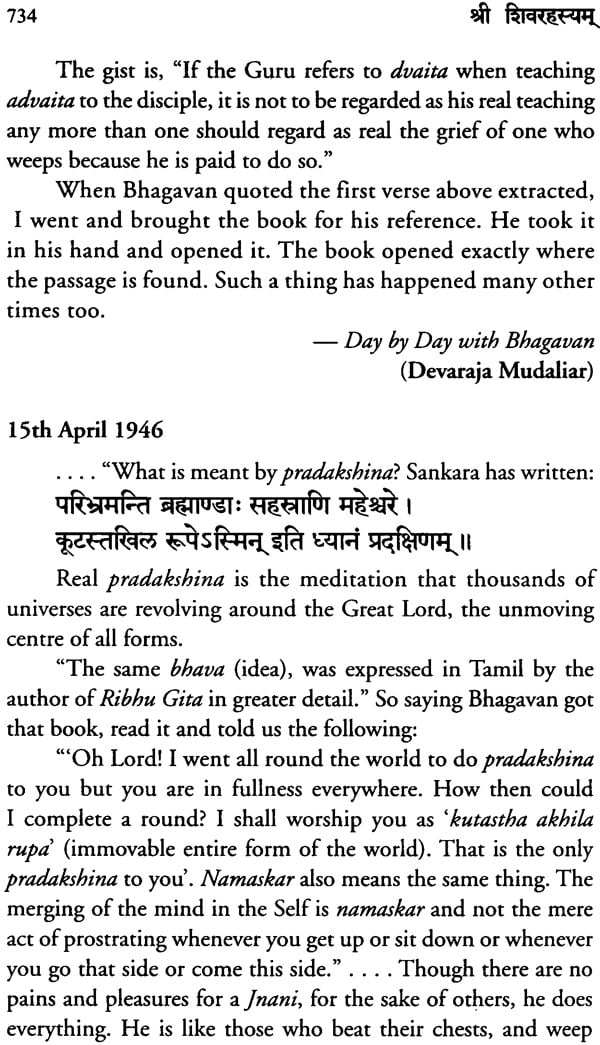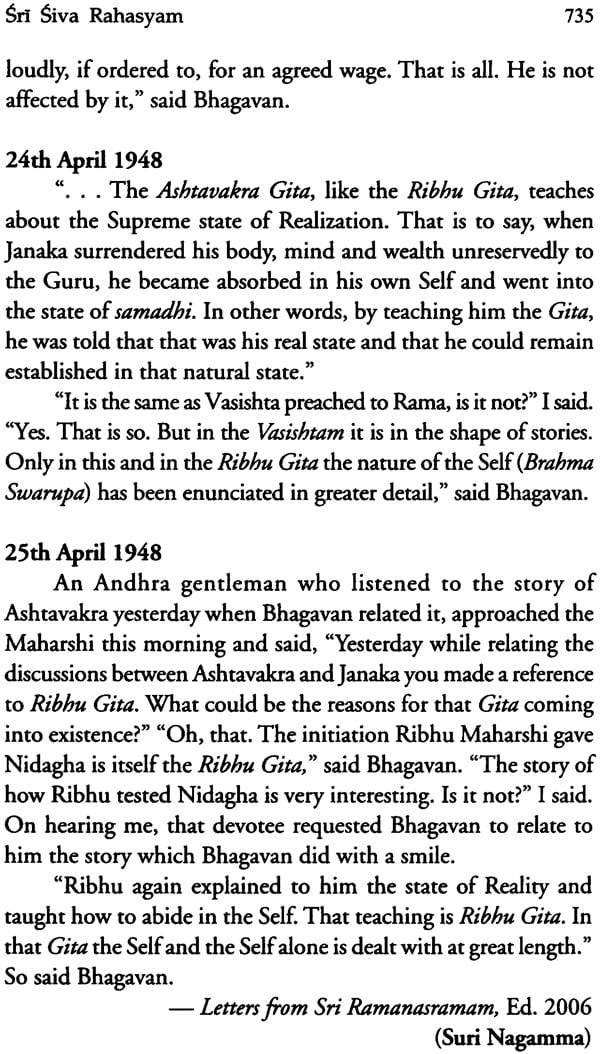
The Ribhu Gita (Sixth Amsa of Sri Siva Rahasyam)
Book Specification
| Item Code: | NAN709 |
| Author: | Dr. Lingeswara Rao and Dr. Anil Sharma |
| Publisher: | Sri Ramanasramam, Tamil Nadu |
| Language: | Sanskrit Text With Transliteration and English Translation |
| Edition: | 2020 |
| ISBN: | 9788182880887 |
| Pages: | 750 |
| Cover: | Paperback |
| Other Details | 8.0 inch X 5.5 inch |
| Weight | 700 gm |
Book Description
Is there a book while reading which, the reader feels increasingly drawn towards his own self even it if the very first spiritual book that he reads? The book which you are now Holding in your hand is certainly one such.
There is no greater testimony to the unique value of Ribhu Cita than the fact that Bhagavan Ramana himself told one of his little educated devotees, Sampurnamma,, "It does not matter if you don't understand the book. Just go through it, it will be of immense benefit to you."
Bhagavan would often say that the recitation of Ribhu Cita is as good as Samadhi and would himself take part in the recitation.
So, let us read, chant and be absorbed in His Grace.
Bhagavan Sri Ramana Maharshi is said to have become a knower of Brahman without knowing the meaning of the word 'Brahman". He, at the tender age of 16, experienced intuitively the reality of the essence underlying all existence, the Self. Absorbed in That, it was only afterwards that h found that his experience of the Self tallied with that of the ancient sages as described in the sacred scriptures. Sri Bhagavan describes his state as follow:
"I did not yet know that there was an Essence or Impersonal Real underlying everything and that God and I were both identical with it. Later, at Tiruvannamalai, as I listened to the Ribhu Gita and other sacred books, I learnt all this and found that they were analysing and naming what I had felt intuitively without analysis or name."
The Ribhu Gita Sri Bhagavan refers to comprises the sixth amsa of the work Sri Siva Rahasyam, and its approximately 2200 stanzas sing the glory of the Self, of Brahman, and the unreality of the perceived world. It is a dialogue between the sage Ribhu and the ripe disciple Nidagha. The Ribhu Gita, by its own terse verse of matchless beauty – a rare combination of thundering sound and soul-stirring significance – forms the third chapter. In addition to this there is a further teaching of reinforcement by Siva. From chapter four on we find Ribhu's teaching in a form that is conducive to practice and comprehension. In the end Nidagha also attains the unitary state of the Self and surrenders himself to his Guru, Ribhu.
The Ribhu Gita is one of the first books read by Bhagavan Sri Raman Maharshi in Tiruvannamalai after attaining Self-Realization at Madurai. Sri Bhagavan and the disciples would sit up, especially after dinner, reciting the Ribhu Gita, each reading a verse by turn. The reading continues for nearly two hours at a stretch. He would say: "These readings from the Ribhu Gita are as good as Samadhi. It does not matter if one understands the meaning or not. Yet, the result can be experienced." It appears from Sri Bhagavan's words that if there is a book the reading of which can attune one's mind to the transcendental state, that is the Ribhu Gita. What more is there to say?
The very book is in our hand and let those who are eager to immerse themselves in the ocean of nectarine bliss and immortality of the Self commence the reading forthwith and experience it.
If the formless Self-Knowledge takes the form of a book, it is The Ribhu Gita.
If the formless God takes the forms of a book, it is The Ribhu Gita.
If the formless Guru takes the form of a book, it is The Ribhu Gita.
If the formless "I" takes the form of a book, it is The Ribhu Gita.
The readers of spiritual lore are aware that majority of the texts contains stories and accounts of various gods and goddesses, about sacred centres and hermitages. Is there any instance where the reader gets to read and know about oneself? Is there such a reader to begin with? If there is such a reader, to that rare one the book is at hand, or, n the hand. The book one is about to read fulfils this very purpose, which is, to let the reader know himself, and there is no other purpose to it.
The present text is popularly known as Ribhu Gita, meaning The song of the sag Ribhu, who received the knowledge from Parama Siva, the Supreme Lord. It forms the sixth canto called Sanskara of the hundred thousand verse long epic Sri Siva Rabhusyam.
Ribhu is the mind-born son of the creator Braham. Being highly dispassionate from birth he could not be convinced by his father to take up the role of progenitor. So, he had to leave the place and refuge in Lord Siva in the Himalayas. Pleased by his single-minded devotion, Siva taught him atma vidua, knowledge of the Self. Ribhu immediately attained the non-dual state of the Self, and broke into a spontaneous hymn of praise to the primal Guru in gratitude. Later, he passed on this knowledge to an ardent aspirant called Nidagha.
A brief introduction to the story and Ribhu's supplication of longing for Self Knowledge form the first chapter of the book. Siva's gracious teaching in a cryptic and aphoristic manner forms the second chapter. Ribhu's hymn of transcendental delight in sublime method, leads us again and again, though many different ways, to this conclusion, that all is Siva, all is Brahman.
That Sri Ramana Maharshi held this work in high esteem is well known. He recommended its study, even if one did not have high literary qualifications so often thought necessary for the for the study of the scriptures. He knew the openness of the heart of the yearning soul.
Sampurnamma, who took refuge at Sri Bhagavan's feet, recalls:
"One day he gave me a copy of Ribhu Gita and asked me to study it. I was not at all anxious to pore over a difficult text good only for learned pundits, and asked to be excused, saying word of it." "It does not matter that you do not understand" he said. "Still it will be of great benefit to you." Years later, as we had the good fortune of seeing Sampurnamma in the ashram, ever absorbed in Sri Bhagavan, we had no doubt that Bhagavan's benediction to her had held true.
Duing our saty at Sri Ramanasramam suring the Navaratri celebration in the fall of 2003, my wife Vijaya and I were thrilled to have the company of Sri Lingeswara, his wife Srimati Udyasri and their son Siva Tejas.
Accompanying them from Bhimavaram was a group of devotees who delighted us with the daily recitation of the Chandi (Sri Devi Mahatmyam). We also had the opportunity at this time to hear portions of the sacred Ribhu Gita recited by Sri Linegeswara and the Bhimavaram devotees. We were transported, as it were, into that Silence of which it speaks.
During giripradakshima around Arunachala oe night, I requested of Sri Lingeswara, "Could you please record for us this particular chapter of Ribhu Gita, in order that we can continue to benefit from hearing it again and again?" Sri Lingeswara or course consented immediately. We left it at that, and continued the giripradakshina, the form of Arunachala Siva shining above us.
Upon return to Canada, I was very happy to receive word from Lingeswara Rao, stating that Sri Ramanasramam, knowing the immense value of this works, had requested him to record not only our discussed chapter, but also entire sixth amsa of the Sri Siva Rahasyam. It is now available for devotees in MP3 Audio forma in Sri Ramanasramam Book Depot.
The present text has been prepared to facilitate the following of the recorded verses. The text is presented in the original Sanskrit, accompanied by an English transliteration. For this we are thankful to Omkarananda Ashrama for the use of their "Itranslator 99" software. Sri Lingeswara has lovingly rendered the English translation.
We are also thankful to Mrs. Udayasi for providing literary support, P. Padma and A.A. Devi for typing the manuscript, K. Padmavati for the proof-reading, with keen attention, k. Pratyusha and K. Pallavi for DTP support and Sri Rambabu for consistently providing in time the required computer assistance.
We are very fortunate to have a true devotee of Sri Bhagavan Ramana Arunachala Siva sing His very words, the Ribhu Gita. Let us listen, follow, chant and be still. Let us be absorbed in that Grace.
Contents
| Introduction | iii |
| Preface | vii |
| Chapter 1 | 1 |
| Chapter 2 | 13 |
| Chapter 3 | 62 |
| Chapter 4 | 84 |
| Chapter 5 | 101 |
| Chapter 6 | 117 |
| Chapter 7 | 131 |
| Chapter 8 | 145 |
| Chapter 9 | 167 |
| Chapter 10 | 184 |
| Chapter 11 | 199 |
| Chapter 12 | 217 |
| Chapter 13 | 234 |
| Chapter 14 | 250 |
| Chapter 15 | 266 |
| Chapter 16 | 282 |
| Chapter 17 | 300 |
| Chapter 18 | 312 |
| Chapter 19 | 328 |
| Chapter 20 | 342 |
| Chapter 21 | 358 |
| Chapter 22 | 373 |
| Chapter 23 | 388 |
| Chapter 24 | 403 |
| Chapter 25 | 418 |
| Chapter 26 | 432 |
| Chapter 27 | 447 |
| Chapter 28 | 456 |
| Chapter 29 | 464 |
| Chapter 30 | 483 |
| Chapter 31 | 498 |
| Chapter 32 | 514 |
| Chapter 33 | 528 |
| Chapter 34 | 542 |
| Chapter 35 | 552 |
| Chapter 36 | 574 |
| Chapter 37 | 574 |
| Chapter 38 | 589 |
| Chapter 39 | 603 |
| Chapter 40 | 614 |
| Chapter 41 | 623 |
| Chapter 42 | 636 |
| Chapter 43 | 643 |
| Chapter 44 | 655 |
| Chapter 45 | 661 |
| Chapter 46 | 669 |
| Chapter 47 | 675 |
| Chapter 48 | 681 |
| Chapter 49 | 690 |
| Chapter 50 | 705 |
| Appendix | 731 |
